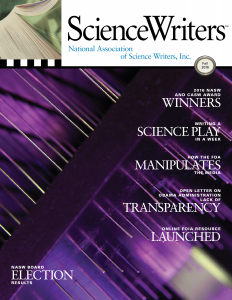By Chris Tachibana
Seattle-based science writers and playwrights collaborated to produce theatrical works in a week
How do you get applause, cheers, and whoops for a science talk? Make it the prologue to a play. This was the hypothesis tested by Centrifuge, an experiment in science and theatre conducted by Seattle’s Infinity Box Theatre Project.
“Theatre is where we come together as a society to do our collective thinking,” said David Mills, artistic director of Infinity Box. “Theatrical stories help us think ahead about the human consequences of changes driven by science and technology.”
For Centrifuge, Mills and colleagues used an established protocol: 14/48. Twice a year in Seattle, playwrights, actors, and directors create and perform 14 new plays in 48 hours, based on a common theme. Centrifuge had a slightly more relaxed pace: five 10-minute science plays generated over five days.

“We all just looked at each other,” said playwright Jennifer Dice, who worked with astronomy blogger Greg Scheiderer. “But then someone explained it’s a sailing term that means purposely changing direction. That’s a natural theme for science.”
The writers discussed recent research news that might inspire their pieces. Playwrights were given a random number of characters and two days to deliver a script. Wednesday night (June 22), the group reconvened. Science writers answered playwrights’ questions, such as “Could a spaceship crashing into an asteroid knock the celestial object off course?” and “How thick is the ice on an ice shelf?” Actors and directors were then randomly assigned to plays. Actors started learning lines, designers planned sets, and directors arranged lighting and sound.
Two days later (June 24), the five resulting plays premiered. The 14/48 formula skips full rehearsals and previews, so Friday’s audience was the first to see all five plays in their entirety.
Before each production, the science writer introduced the play. Some used charts and diagrams; some simply shared a fascinating research story. The results of this theatrical experiment supported the Infinity Box team’s hypothesis. The audience, primed to hear stories of love and adventure, laughter and tears, enthusiastically embraced the scientific presentations.
Science drove the playwrights’ plots. Their works incorporated recent findings about frog mating, asteroids, Homo floresiensis, climate change, and Alzheimer’s disease. People assumed amphibian sexual positions. Penguins wrung their flippers over rising temperatures. A doctor used the phrase “ready about and hard to lee” to explain how people with dementia perform habitual tasks using procedural memory.
The actors occasionally had to cram the explanation of a scientific discovery into just a few lines. However, all five pieces rewarded viewers with an imaginative take on a scientific development. The audience of more than 100 people gasped at a teenager learning her true genomic heritage, roared as a predatory seal took out a main character, and sighed over a family sharing memories of a garden.

Exhausted, exhilarated participants endorsed the hurried process. Science writer Genevieve Wanucha of the University of Washington said that, for her, the experience was an exercise in the first rule of communication: consider your audience.
Playwright Bret Fetzer said he and science writer Michael Bradbury agreed that their goal was to entertain, not lecture. They wanted to make climate change emotionally resonant.
“A lot of people get paralyzed because they feel powerless to stop climate change,” Fetzer said. “I’d like to refresh the sense in people that this is really happening, maybe make them feel a little pang that gets them to write to Congress.”
Fetzer had realistic ambitions for the work, though. “I mean, it’s a 10-minute play about penguins,” he said.
“Five Days, Five Science Plays,” The Scientist, July 1, 2016.
Chris Tachibana is science writer based in Seattle, Wash. and Copenhagen, Denmark.
The Birthday Present by Scotto Moore starred Mark Waldstein, Marita Phelps, and Tracy Leigh. Directed by Kathryn Stewart and introduced by science writer Keith Seinfeld
A Few Things Remain by Pamela Hobart Carter featured Geni Hawkins and Meena Rishi. Directed by Lenore Bensinger and introduced by science writer Genevieve Wanucha.
(NASW members can read the rest of the Fall 2016 ScienceWriters by logging into the members area.) Free sample issue. How to join NASW.


